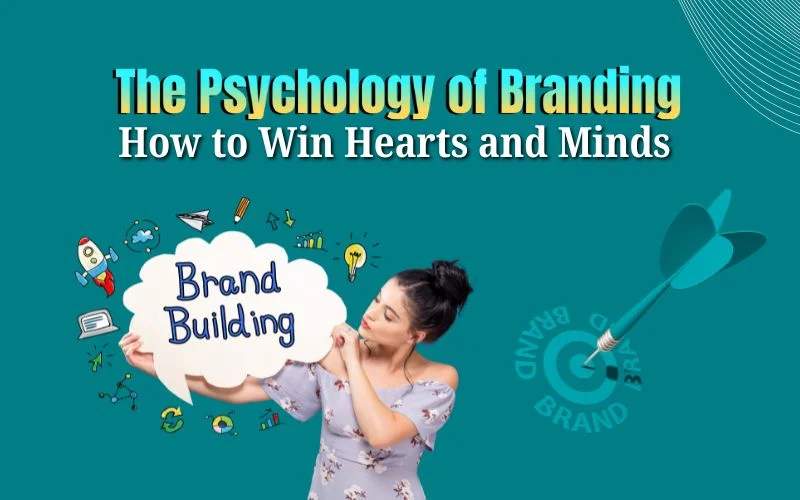In today’s hyper-competitive market, having a great product or service isn’t enough. Successful businesses know that customers buy with their hearts before their heads. This is where the psychology of branding comes into play. Branding isn’t just about logos, colors, or catchy slogans; it’s about creating an emotional connection that makes people feel understood, valued, and loyal to your business.
In this blog, we’ll explore how understanding the psychology behind branding can help you win hearts and minds—and ultimately, customers.
Why Psychology Matters in Branding
Every purchasing decision is influenced by emotions, even when we think we’re being logical. Studies show that 95% of buying decisions are subconscious, driven by feelings and perceptions rather than pure facts. This means your brand needs to resonate on a deeper level.
When customers connect emotionally with a brand, they’re more likely to trust it, recommend it, and stay loyal for the long term. Brands like Apple, Nike, and Coca-Cola have mastered this art. They don’t just sell products—they sell lifestyles, aspirations, and feelings.
Build a Strong Brand Identity
A clear and consistent brand identity is the foundation of effective branding psychology. It’s how people recognize and remember your business. This includes:
- Logo and design: Use colors and fonts that align with your brand’s personality. For example, blue represents trust and professionalism, while red evokes excitement and passion.
- Tone of voice: How you communicate matters. Are you friendly, authoritative, playful, or inspiring?
- Core values: Customers align with brands that share their values. Clearly communicate what you stand for.
Consistency across all platforms—your website, social media, packaging, and marketing—builds familiarity and trust.
Tell Stories That Connect Emotionally
Humans are wired to respond to stories. A strong Psychology of Branding uses storytelling to create emotional bonds with its audience.
- Share your origin story: Why did you start your business? What problem were you trying to solve?
- Show customer experiences: Use testimonials, reviews, and case studies to make your brand relatable.
- Create aspirational narratives: Show customers how your product or service can improve their lives.
Stories help customers see themselves as part of your brand’s journey, turning buyers into loyal advocates.
Use Color Psychology Strategically
Color is one of the most powerful tools in Psychology of Branding. Different colors trigger different emotions:
- Blue: Trust, reliability, calm
- Red: Energy, excitement, urgency
- Green: Growth, balance, health
- Black: Luxury, sophistication
- Yellow: Optimism, happiness
Choose a color palette that reflects your brand’s personality and resonates with your audience. But remember—less is more. Overusing colors can confuse or overwhelm potential customers.
Create a Sense of Belonging
People naturally want to feel part of something bigger than themselves. Great brands build communities, not just customer bases.
- Encourage user-generated content and hashtags on social media.
- Offer exclusive perks or memberships to loyal customers.
- Engage with your audience regularly—respond to comments, celebrate milestones, and show appreciation.
When customers feel like they belong, they become emotionally invested in your brand.
Appeal to Aspirations, Not Just Needs
While your product may solve a problem, your brand should also inspire customers to become the best version of themselves. Think of how Nike’s tagline, “Just Do It,” motivates people to push beyond their limits.
Ask yourself:
- What transformation can your product or service deliver?
- How can your brand make customers feel more confident, successful, or happy?
Appealing to aspirations builds stronger, longer-lasting connections.
Build Trust Through Authenticity
In the age of social media and online reviews, authenticity is non-negotiable. Customers can quickly tell if a brand is being fake.
- Be transparent about your processes, pricing, and policies.
- Admit mistakes and show how you’re fixing them.
- Share behind-the-scenes content to humanize your brand.
Trust is the foundation of emotional branding. When customers believe in you, they’ll stick with you even when competitors come knocking.
Leverage Social Proof
Psychology shows that people are more likely to trust a brand if others already do. This is why social proof is so powerful:
- Showcase positive customer reviews and testimonials.
- Highlight partnerships, certifications, or awards.
- Display real usage statistics (e.g., “Trusted by 10,000+ customers worldwide”).
Social proof reassures potential buyers that they’re making the right choice.
Conclusion: Win Hearts, and Minds Will Follow
Branding isn’t about being flashy or trendy. It’s about making your audience feel something every time they interact with your business. By leveraging the psychology of branding, you can create a brand that people trust, love, and advocate for.
Start small—refine your brand identity, tell meaningful stories, and connect emotionally with your audience. Over time, you’ll build a brand that doesn’t just sell products but also wins hearts and minds.
👉 Need help crafting a brand identity that stands out? Contact us today and let’s elevate your brand together!












